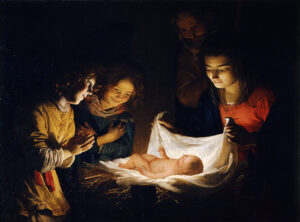Fr Neil’s homily at our Midnight Mass of the Nativity, 25 December 2021
The people who walked in darkness have seen a great light, those who dwelt in a land of deep darkness, on them has light shined.¹
The birth of any baby is usually — for the family, community and wider society — a sign of hope. It enables us to smile and feel warm inside, even if we might be carrying a sense of sorrow at the time.
The falling birth rate in our modern Western world should make us wake up to the fact that something isn’t right. It might mean that the idea of family and support of marriage is undervalued or even under attack. Whenever family is being diminished, you will often find a movement away from belief in God, and a society that ends up in crisis.
If we take finance alone, we are aware that there is a housing crisis for the younger generation. Many grown-up children are still living with their parents into their late twenties and mid-thirties because they cannot afford the astronomic rental rates, let alone a mortgage. While there are other factors like the internet creating distorted expectations of relationships, and ‘alternative family structures’ being normalised as equally valid, the financial issue alone means later and fewer children are being born.
It would be easy to despair as society seems unable to navigate its way out of this ever-decreasing cycle of self-destruction. All the voices we hear are either those saying nothing for fear of losing popularity or being destroyed via social media — or the screaming, raging cries of the extremists who wish to shut down all debate.
Into the midst of this broken world we remember a child who was born two thousand years ago. Even today in the mostly secularist world the celebration of Christ’s birth continues. Christmas often forces us to think about family; to put aside our normal routine and visit friends and relatives. We might tell family stories, laugh, fight, and grieve those who are no longer with us. Our families might be easy, difficult or impossible, but each family tells us something about where we have come from and shaped part of who we are today.
The birth of this baby sees God entering into humanity’s story. In our readings, Christ is spoken of as a light that shines upon us. He is the light that illumines a way through the many contradictions of our own story and reveals that where we are now need not be where we stay. There is a way forward out of the confusion so that we might discover who we truly are. Christ reveals that the true longing of our heart is far more complex that we might ever have thought.
That longing is often, in biblical terms, poetically imagined in the Garden of Eden. It is a scene of humanity’s first innocence, where there is peace with the created order and a fellowship between humans that does not expose it to disordered desires and does not hide in fear of exploitation and violence. The relationship with God is perfectly normal, natural and without doubt or shame.
We long for Eden. Yet the Fall saw the first act of self-destruction and ever since then our garden of hope has been endangered by the self-destructive acts of ourselves and others.
Into this brokenness comes Christ, the Light of the World. He comes not to show us the way out to a restored Eden, but to something even greater. His will is that we might be raised up beyond Eden to participate in the heart of the Godhead. Not to be just at ease with God but in union with God. Just as in marriage each person contains their own integrity yet they become one flesh, so in Christ we might share in his divinity.
This Christ-child in his nativity unites heaven and earth, the divine and human, the temporal and eternity and invites us to participate in his great work of redemption. This is the great gift of Christmas and worth truly celebrating, despite the raging of the world around us. It gives a hope that is not wishful thinking but certainty in times of darkness.
Those who dwelt in a land of deep darkness, on them has light shined!
¹ Isaiah 9:2








 Posts
Posts